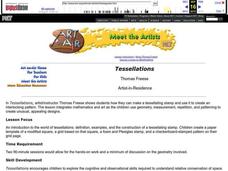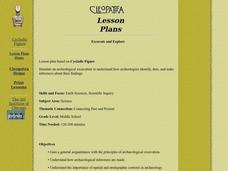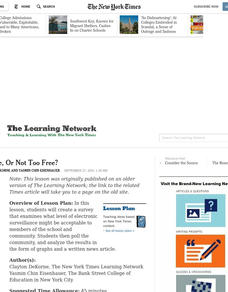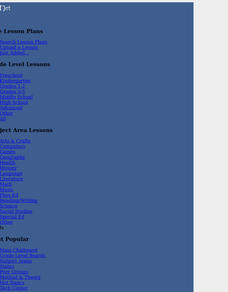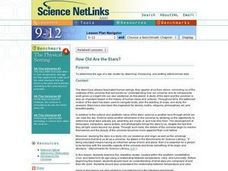Curated OER
The Price of Relief
Students calculate and graph the costs of essential items needed in Kosovar refugee camps on an individual, family, and camp basis. Additionally, students explore how relief organizations and businesses participate in relief efforts.
Curated OER
Working It Out
Students participate in a simulation in which they are arbitrarily assigned different work roles and compare their experiences to those discussed in a New York Times article about the racial divisions in a pork production plant.
Curated OER
Bones, Bones, and More Bones
Learners describe the functions of bones in the human body. They describe the make up of a bone. They engage in a series of wonderful hands-on activitiies that reinforce learning of bones and the skeletal system.
Curated OER
Explosive Knowledge
Students examine China's suspected theft of American nuclear secrets, as a springboard for the creation of a research-based, multi-tiered timeline that traces the development, regulation, and use of nuclear weapons from the 1940's to today.
Curated OER
Capitol Gains
Students use a variety of Web sites to obtain specific information about the campaign finances of different Presidential hopefuls. They create graphs that illustrate all of the aspects of campaign finances researched,
Curated OER
ME Cards
Young scholars improve their self-esteem by telling others about skills, talents, and characteristics that make them unique and special.
Curated OER
Tessellations
Young scholars learn and review basic geometric terms, definitions, and theory, including regular polygons, lines, angles, points, etc. They make a tessellating stamp and create a repeating work of art.
Curated OER
Excavate and Explore
Students simulate an archeological excavation to explain how archeologists identify, date, and make inferences about their findings. They explain the importance of spatial and stratigraphic contexts in archaeology.
Curated OER
Empire State-Building
Students explore how empires around the globe have impacted the world in which they have existed. They analyze whether or not the United States is an imperialist nation and create their own empires based on their understanding of empires...
Curated OER
Stories That Really Add Up
Students, in groups, develop math lessons for younger students that each stems from a popular student story. Group members individually develop lessons for other subject areas based on their group's story, creating interdisciplinary units.
Curated OER
Too Free, Or Not Too Free?
Students create a survey that examines what level of electronic surveillance might be acceptable to members of the school and community. They poll the community, and analyze the results in the form of graphs and a written news article.
Curated OER
The Effects of Meteor Impacts
Students investigate meteor impacts on the Earth's surface by using different size balls and charting their impacts, given their diameter and mass.
Curated OER
Properties of the Ocean: Change
Students research and create a visual presentation on the seasonal salinity of the Earth's oceans. They apply the research in a simulation of a lab disaster in which they must relabel ocean samples.
Curated OER
Surface to Volume Ratios
Young scholars measure the rate of diffusion and to calculate the surface area to volume ratios of varying cell sizes. The lesson is very clearly organized with a useful student worksheet provided. They perform a lab experiment which is...
Curated OER
Magnets
Students demonstrate the process of science by posing questions and investigating phenomena through language, methods and instruments of science as they experiment at four teacher-created stations to explain the fundamentals of magnetism.
Curated OER
This Is a Stick Up
Students create a sundial and track the movement of the sun throughout the day. Modifications to the lesson plan are provided for both lower and upper elementary students.
Curated OER
The Internet Pizza Server - Creating Your Own Pizza
Young scholars create their own pizza, "order" it from the Internet, and see digitized versions. They calculate the area of various size pizzas in order to do cost analysis to determine best buys.
Curated OER
How Old Are the Stars?
Students determine the age of a star cluster by observing, measuring, and plotting astronomical data. They examine the Jewe lbox cluster, located within the southern constellation Crux and determine its age.
Curated OER
Buoyant Boats
Students design and construct a boat out of aluminum foil and a few other simple materials. The boats then be tested by floating them in water, then adding mass until they sink. They explore the various shapes of boat construction.
Curated OER
Monkey See, Monkey Do
Students consider the influence of bullies and map the social ecosystem of their schools. They create lifelines that compare baboon and human development and write an essay that considers the relationship between psychosocial development...
Curated OER
People Are Like Peas in a Pod
Young scholars experiment with pea pods to observe/appreciate the diversity of individuals within a population, and to explain of how dominant and recessive traits, genotypes, and phenotypes help produce variation in a population.
Curated OER
Wonderful Worms
Students identify living and non-living things and explain the importance of earthworms to the soil. They name some basic facts about earthworms, recognize basic worm vocabulary words and demonstrate vermicomposting techniques.
Curated OER
Georgia O'Keeffe Watercolor
High schoolers demonstrate three different watercolor techniques using flower pictures and flowers as the inspiration. They work with organic shapes.
Curated OER
Great Graphing
Students collect data, use a computer spreadsheet program to create various graphs, and compare the graphs. They state the findings of each graph in writing and decide which graph type best represents the data.
Other popular searches
- Measuring With a Ruler
- Metric System Ruler
- Kings and Rulers
- Standard Measurement Rulers
- Metric Ruler
- Using a Ruler
- Reading a Ruler
- Measuring Using a Ruler
- Ruler Measurement
- Paper Rulers
- Measure With Inch Ruler
- Measurement With a Ruler








